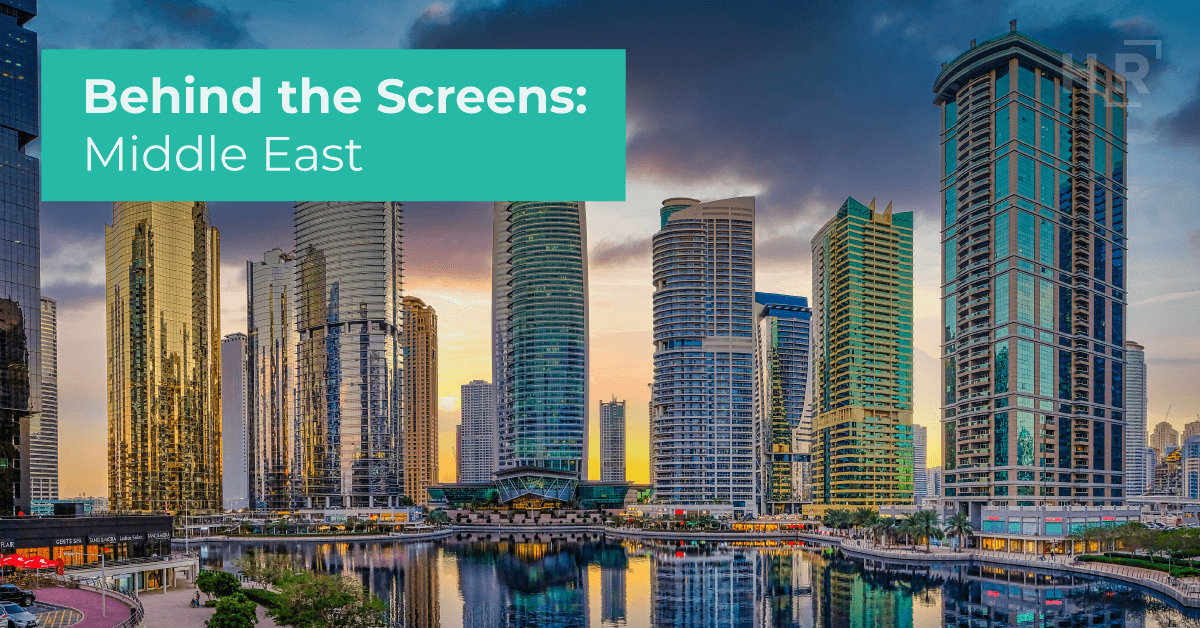Behind the Screens: Meet the HireRight team in the Middle East
For this latest installment in our Behind the Screens series, James Randall, recently appointed Director of the Middle East, and Account Director Carl Simington shared more about background screening in the Middle East, some of the challenges faced in the region, and how things are different from background screening in the rest of EMEA.

This blog was originally published on Arabian Business on 10 February 2022.
Since 2016, HireRight has had a local presence in the Middle East, with our office in Dubai, United Arab Emirates (UAE), acting as a valuable foothold for our business in the region. As Managing Director for EMEA, it’s important for me to grow our presence throughout the region, and the Middle East has long been an area of interest due to its increasing adoption of screening. With some of our largest customers in EMEA based in the Middle East, we plan to continue our focus and growth in the region, so we can best support both local and global customers hiring there.
For this latest instalment in our Behind the Screens series, James Randall, recently appointed Director of the Middle East, and Account Director Carl Simington shared more about background screening in the Middle East, some of the challenges faced in the region, and how things are different from background screening in the rest of EMEA.
Firstly, what are your roles at HireRight, and long have you worked for the company?
James: I joined HireRight just under six years ago, working as the Regional Sales Manager for the Middle East before I was made Director of the Middle East earlier in 2021. My new role involves working alongside Peter on the overarching strategy for the region, such as which verticals to focus on, as well as continuing to drive bottom-line revenue and top-line bookings through new business in the region.
Carl: I work as an Account Director, joining the company just over five years ago. My role is slightly different from other Account Directors in EMEA as I manage a range of accounts for our customers based in the Middle East, covering many different verticals. Additionally, I’m actively involved in supporting James in the sales process by joining new customer meetings and working on new accounts in the region sooner than an Account Director would typically be involved.
Tell us a little about the different customers that you support in your role.
Carl: We support customers from many different industries in the Middle East including Government, Finance, Pharmaceuticals, Construction, Education, and Global Consultancy firms.
James: Our customers in the region include some of the largest banks in the Middle East, local government and quasi-government organisations, and many large multinationals and premium global brands operating in the region. We also support smaller local businesses covering a full range of verticals.
What is background screening like in the Middle East, and how is it different from the rest of the world?
James: The Middle East has an eclectic, transient workforce with people hired from all over the world. Whereas companies in the UK and the U.S. often focus on domestic hires, the UAE looks to hire globally to secure the best talent. When it comes to background checks, this means that employers may look a little deeper into their candidates’ backgrounds, for example running a criminal check in a candidate’s previous countries of residence, to get a more thorough picture of their past activity.
Typically, multinational employers who are operating in both the Middle East and the UK will mirror their screening packages in the UK for their candidates in the Middle East, subject to local laws and availability of products, for example, a UK Right to Work check would not be applicable in the Middle East.
Carl: I think that compared to the UK and some other European countries where screening is more established, the Middle East is still learning about background screening. For some industries, it’s a compliance tick box that they are required to complete, but for others, it’s seen as more of a “nice to have”.
If you asked the average person on the street here about background screening, I think they’d probably think you were some sort of spy working for the government, like James Bond, and might likely say the familiar line, “well, don’t check my background!”
Are there any unique challenges your customers in the region experience?
Carl: There are many countries in and around the region where source verifications can take a little longer than the rest of EMEA to complete. With screening being relatively new and/or uncommon in these countries, it can be difficult to get responses to verify information at source. While we do all we can to meet our target turnaround times, source verifications may take longer than the other background check components, so it’s important for me to manage my customers’ expectations when conducting checks on candidates in these countries to ensure these potentially longer turnaround times are factored into their recruitment timelines.
Additionally, there can be a big cultural difference between the Middle East and the rest of the EMEA region, and it’s important to understand this to help best support our customers through the screening process. It can sometimes be difficult to support candidates with a more laid-back approach to background screening, as they may not understand the importance of providing their information in a timely manner and the impact not doing so may have on their time to hire.
James: To add to Carl’s first point, I think the challenge is due to the infrastructure in place to support verifications at source in the region. Many sources still need to be verified by somebody physically going to check the information at the source, for example, criminal checks at a local courthouse. The information they are then provided with will typically be in Arabic, needing to be translated into English before it can be verified, adding time to the verification process.
Another challenge in the region, which is linked to this manual verification process, is the extended public celebrations and holidays. During Ramadan, for example, businesses may be running on reduced hours for a whole month to accommodate fasting, so in-person verifications may be harder to obtain or take longer to do so. It’s vital that employers are aware of these limitations so they can factor them into their hiring timescales.
How has background screening in the Middle East changed over the last few years?
Carl: For the most part, background screening has become more popular in the Middle East since I joined HireRight five years ago. For more and more organisations, background screening is becoming a part of the standard hiring process, whether that be for projects hiring contractors or organisations simply hiring full-time employees.
James: Since I’ve been working at HireRight, there has been a large growth in the education and understanding of screening in the region. Whereas previously companies didn’t need or want to look at background screening, there is now a much greater appetite for it. Businesses will also now typically understand more about what the screening process will usually include, for example, a criminal check, a security check, and academic verifications.
In the last two years, much like the rest of the world, employers in the Middle East have become a little more cautious around who they are working with, due to having people working from home en masse.
Additionally, new regulations are soon to be introduced in Saudi Arabia and the UAE, which will impact both the Financial Services sector and the free-trade zones, including Abu Dhabi Global Market (ADGM), Dubai Multi Commodities Centre (DMCC), and Dubai International Finance Centre (DIFC). These new regulations may soon have an impact on the requirements for background screening in the region, and as things continue to develop, I see background screening become a more integral part of the onboarding process for a wider range of organisations.
How important is it for businesses to have a presence on the ground in the region?
Carl: Having a presence in the region is hugely important for our customers here, many of whom work with us because they know that we are in-region, and we have that local knowledge and expertise to service their needs. For our global customers, they are reassured by knowing that we have on-the-ground support in each region where they operate.
Our office in Dubai helps us to build and maintain strong customer relationships in the region and is seen as a real value-add to the businesses we work with throughout the Middle East. Additionally, James and I work closely with Noelle, an Arabic-speaking Account Manager at HireRight, to help support our customers in-region in their native tongue. The combination of speaking their language and being able to meet in person (outside of pandemic restrictions, of course) makes a big difference in the Middle East, helping to show that we understand their needs and value their business.
James: For more transactional customers, for example those only hiring a handful of candidates each year, the face-to-face meetings are less important, as screening isn’t a big part of their world. However, for other companies who onboard hundreds if not thousands of workers each year, it’s very important to “press the flesh” (shake hands) and meet in person. It makes it much easier to build trust and goes hand in hand with the more traditional way that business is typically conducted in the region.
While the pandemic has certainly limited the number of in-person interactions that have taken place, I certainly don’t think that virtual meetings will completely take over in the future.
Finally, what do you like the best about working and living in the Middle East?
Carl: I was initially drawn to the Middle East, as many are, by the lure of the bright sun every day, tax-free living, and the prospect of saving some money. In reality, the living costs in the country are quite high so it doesn’t quite work out that way, but I find the UAE, and in particular, Dubai, to be a safe, clean, and exciting place to live. Crime is dealt with very firmly here, so this leaves the residents feeling very secure, and the streets are very clean, with very little rubbish, making it an enjoyable place to live.
The region is a hub for new technology and innovation, and with events like EXPO 2020, which launched on September 30, 2021, due to the pandemic, it is a vibrant and thriving place to live. I enjoy travelling to different countries, but I’m always glad to come home to Dubai.
James: I really enjoy the working environment in Dubai. The area is a multicultural melting pot that is rich in tradition, and always lots going on. And the sunshine certainly isn’t bad either!
Read more from our EMEA Behind the Screens series:
Unmasking Background Screening in Europe
Meet the HireRight EMEA Customer Service Team
Meet the HireRight EMEA Account Management Team
To find out more about background screening in the Middle East, contact James Randall.
